Growing Vertically Integrated Projects (VIP) program offers undergraduates real-world research experience
But learning is enriched immensely when undergraduate students can augment traditional education with the real-world experience of participating in important, long-term, collaborative research projects, mentored by faculty members and graduate students.
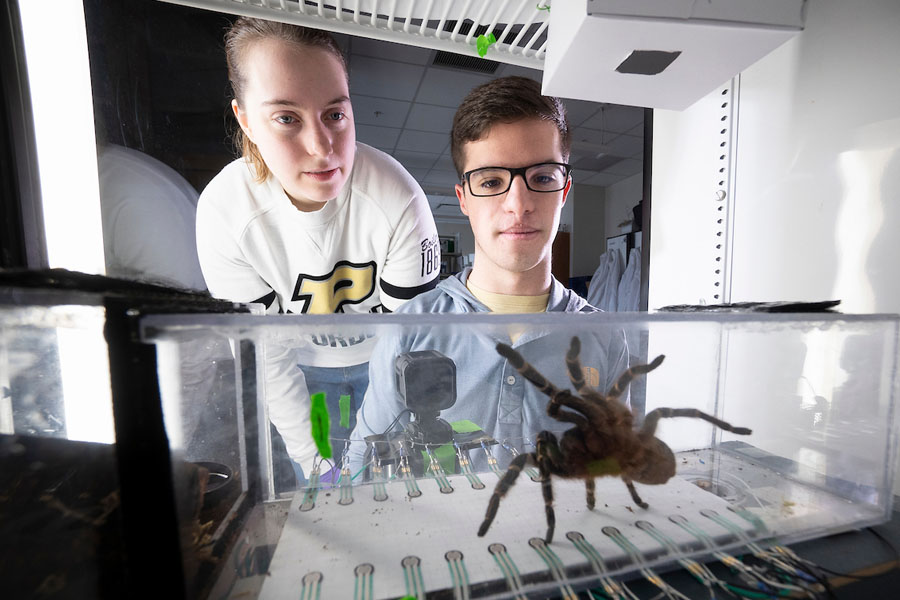 Lunabotics VIP team members Dana Moryl (left), a Biomedical Engineering (BME) master’s student, and Chase Weinstein, a First-Year Engineering student, observe and record the motion of a tarantula to help them design a robot with similar movement. Moryl has since graduated and become an associate clinical account specialist with Biosense Webster, and Weinstein is a Mechanical Engineering sophomore with a BME concentration. (Purdue University Photo/Vincent Walter. Photos in this story were taken before Purdue instituted remote learning and social distancing in March 2020 and the requirement for face masks while indoors and in close-quarters settings.)
Lunabotics VIP team members Dana Moryl (left), a Biomedical Engineering (BME) master’s student, and Chase Weinstein, a First-Year Engineering student, observe and record the motion of a tarantula to help them design a robot with similar movement. Moryl has since graduated and become an associate clinical account specialist with Biosense Webster, and Weinstein is a Mechanical Engineering sophomore with a BME concentration. (Purdue University Photo/Vincent Walter. Photos in this story were taken before Purdue instituted remote learning and social distancing in March 2020 and the requirement for face masks while indoors and in close-quarters settings.)
Purdue Engineering’s Vertically Integrated Projects (VIP) program provides that experiential learning opportunity – and its enrollment has grown by 74 percent in the last year despite the COVID-19 pandemic.
Part of the G.R.I.T.+ initiative and formally launched College-wide in 2019 after many years in the making, VIP enables undergraduates to earn academic credit while engaging in authentic and extended research and design projects. These projects support Purdue faculty members’ active research areas and address national, international and industry-sponsored design challenges.
From its Purdue birthplace, VIP has evolved into a global consortium of 42 institutions, involving thousands of students every semester, which won the prestigious ABET Innovation Award for 2019.
“Rapid growth trajectory”
“VIP is experiencing a rapid growth trajectory at Purdue, even during the pandemic,” said Carla Zoltowski, Purdue VIP director and assistant professor of engineering practice in the School of Electrical and Computer Engineering (ECE).
From 2019-2020 to 2020-2021, the number of undergraduate participants increased from 426 to 741. In the same time frame, the number of project teams rose from 36 to 52. Research areas include several engineering disciplines, as well as such other fields as data science, forestry, psychology, and landscape architecture.
“VIP enables an undergraduate to work on teams with a faculty advisor or graduate-student mentor in a vertically integrated environment – spanning grade levels – and a multidisciplinary setting,” Zoltowski said. “Going beyond the classroom, students get to participate in research projects in meaningful ways with a supportive infrastructure.”
Multiple disciplines, enhanced understanding
“VIP brings together students and faculty from different disciplines for multi-semester projects, providing undergraduates a deeper, broader and clearer understanding of a project life cycle,” Zoltowski noted.
“Experiences with the program allow students to be better-prepared to pursue graduate school or work in industry. Students gain hands-on opportunities to synthesize, integrate and apply their course learnings. They get to work on complex, open-ended problems, developing and demonstrating cutting-edge skills in a real-world social, cultural and ethical context.”
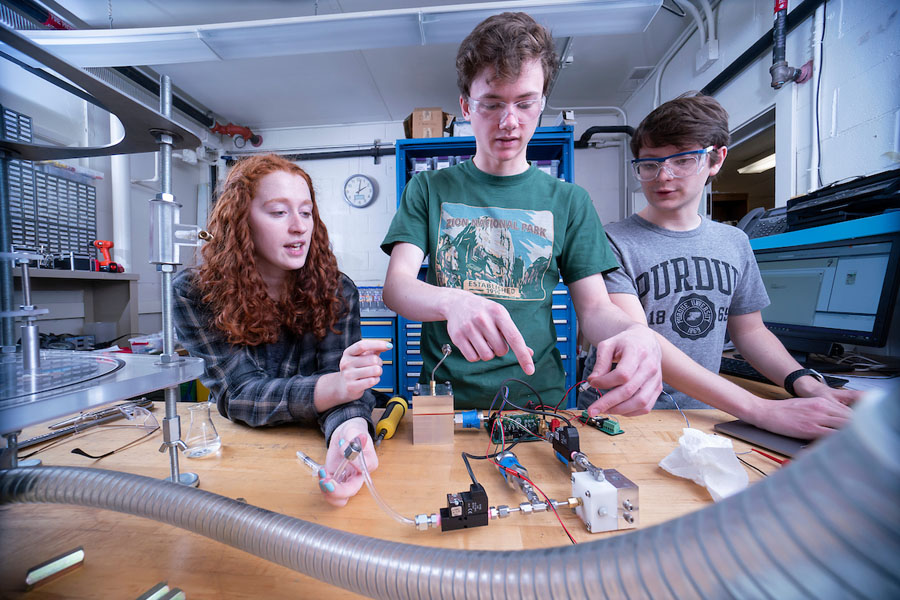 From left to right, FEMTA VIP team members Samantha Kiddy, an Aeronautics and Astronautics (AAE) senior who has since graduated; Mark Hartigan, an AAE senior and current FEMTA project manager; and Noah Franks, then a senior and now a graduate student in computer science, prepare to conduct a flow test on the propellant management system at Purdue’s Aerospace Sciences Laboratory. (Purdue University Photo/Vincent Walter)
From left to right, FEMTA VIP team members Samantha Kiddy, an Aeronautics and Astronautics (AAE) senior who has since graduated; Mark Hartigan, an AAE senior and current FEMTA project manager; and Noah Franks, then a senior and now a graduate student in computer science, prepare to conduct a flow test on the propellant management system at Purdue’s Aerospace Sciences Laboratory. (Purdue University Photo/Vincent Walter)
Along with offering research exposure, Zoltowski said, “VIP helps students stretch their imagination; express their creativity; and hone collaboration, communication and leadership skills.” For example, students attend professional development sessions, lead teams, write research papers, develop and deliver poster presentations, take part in semiannual conferences, and taste entrepreneurship.
Research launching pad
Everyone involved in VIP benefits. Graduate students learn to become mentors, while VIP helps faculty and graduate students move research forward.
“VIP is a vehicle to carry out research initiatives, some of which can be commercialized,” said Yung-Hsiang Lu, a VIP Leadership Team member, ECE professor, Dean’s Faculty Fellow in Entrepreneurship, and inaugural director of the John Martinson Engineering Entrepreneurship Center. “The program has enabled me to explore new research directions, and to begin research I couldn’t otherwise have started before receiving funding.”

A case in point is the CAM2 (Continuous Analysis of Many CAMeras, pronounced “CAM squared”) projects Lu advises. Built by Purdue researchers, CAM2 is the world’s largest camera network – a cloud-based system, available to researchers worldwide, that uses 120,000 cameras in 162 countries to analyze streaming data while protecting personal privacy. VIP teams have used CAM2’s computer vision platform to study topics from customer behavior to human detection, to urban transportation, to natural disasters.
Funded by the National Science Foundation (NSF), Google, and Facebook, the CAM2 project has generated two patents. In addition, CAM2 has spawned two student-founded companies that together have garnered more than $1.5 million in NSF and Purdue support. And ECE senior Isha Ghodgaonkar, the lead author of a research paper on CAM2 team work, received an NSF Graduate Research Fellowship.
“VIP students have opportunities to work on research sponsored by Google, Facebook, Intel, HP and other industry innovators,” Lu said. “We’ve had students on video calls with some of these companies, and VIP participants are in high demand for jobs; one received four offers in a month.”
Similarly, Jan Allebach, a VIP co-founder and Leadership Team member, who serves as the Hewlett-Packard Distinguished Professor of Electrical and Computer Engineering, attests to the program’s advantages in developing students and advancing research. Allebach joined Ed Coyle – former Purdue ECE professor, and currently director of the Arbutus Center for the Integration of Research and Education and the John B. Peatman Distinguished Professor at Georgia Tech – along with several other Purdue ECE professors in originating VIP, modeling it after EPICS.
“VIP offers students a unique experience and has helped faculty members make tremendous progress in meeting research objectives,” Allebach said.
“In a supportive environment, undergraduates learn workplace skills, such as how to respect, seek help from and build relationships with colleagues of different ages and disciplines. They also get to engage directly with faculty and work on a team – for the first time in many cases. In addition, graduate students really step up to the plate and take responsibility and initiative.”
Allebach said VIP has been a catalyst for his research projects, funded by such industry sponsors as four HP divisions, Poshmark, and Chinese electronics enterprise SunValley Tek Group. For example, in a project for HP Labs, the Imaging and Printing team he advised used a deep learning algorithm to train a computer to detect and recognize the emotions expressed by people in video sequences. Other projects have included creating tools to detect dust and diagnose print-quality defects in printers, as well as developing a printer to print images on fingernails.
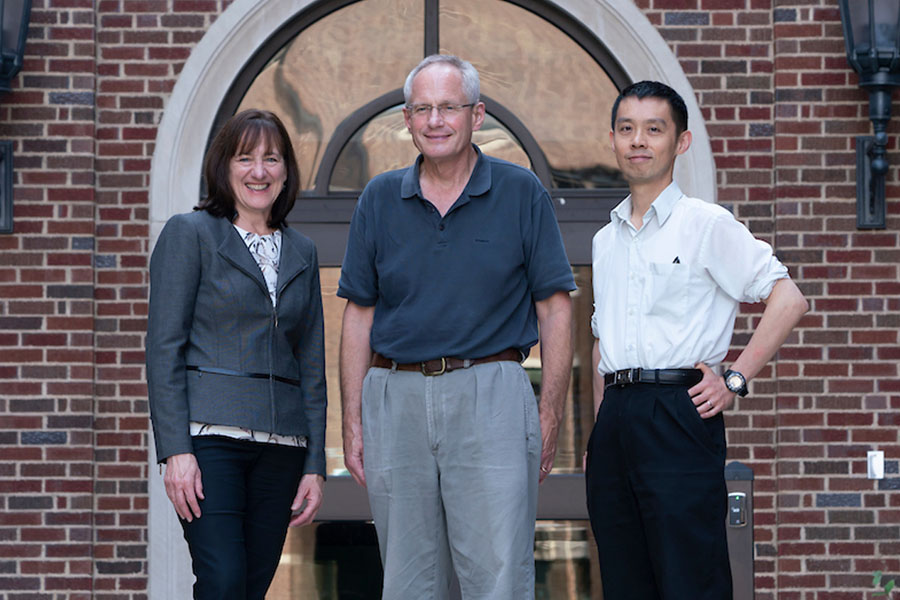 VIP Leadership Team (left to right): Carla Zoltowski, Jan Allebach and Yung-Hsiang Lu (Purdue University Photo/Vincent Walter)
VIP Leadership Team (left to right): Carla Zoltowski, Jan Allebach and Yung-Hsiang Lu (Purdue University Photo/Vincent Walter)
“Incredibly insightful experience”
“Participating in VIP for a year was an incredibly insightful experience, much different from any classroom setting,” said Damini Rijhwani, who led a CAM2 project and was one of three VIP students to receive honorable mention for the Computing Research Association (CRA)’s Outstanding Undergraduate Researcher Award for 2020.
“VIP provides an environment in which you can test your creativity in fields at the highest level of innovation. You absorb knowledge with a very steep learning curve at the master's/PhD/industry level. With research, you question the current state of solutions – and question everything you read – to find gaps in a solution or opportunities to extend a solution.”
Rijhwani, now a Philips research scientist, added: “In a classroom, you solve problems, but in VIP, you go the extra distance to develop the skillset to identify pertinent problems. I also learned from an amazing community of peers, in addition to pursuing independent research.”
She continued: “I obtained an internship and received job offers solely because of my VIP work, including leading teams and writing research papers. Managing a team helped me develop leadership and presentation skills, handle conflict, and deal with challenges in real-world settings.”
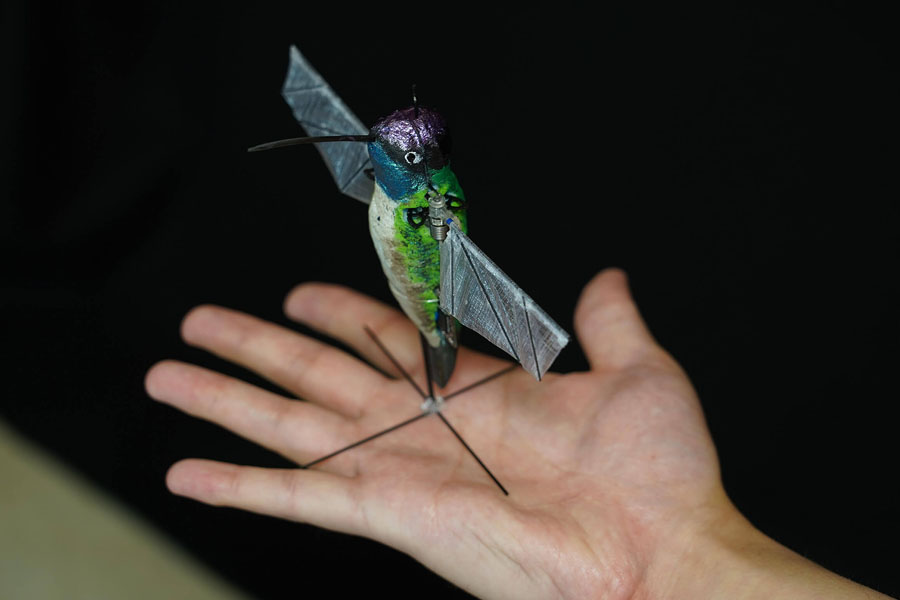 Hummingbird-inspired robot
Hummingbird-inspired robot
Another undergraduate who has benefited from VIP participation is Nanami Hariguchi, who served on the Bio-inspired Aerial Robots (Flapping Flight in Turbulence) team as a First-year Engineering student.
“I found it helpful to learn about different aspects of a whole research project, from experimental setup to data analysis,” said Hariguchi, now a sophomore. “The work included reading relevant research papers and then applying what I’d learned to the project and developing it further, which I enjoyed a lot.”
In addition, she said: “Having this experience in my first year gave me a general sense early on of what research is and what a research career would be like. The course was challenging and required time, but the skills I acquired were really worth the effort. For these benefits, I recommend that undergraduate students participate in VIP.”
Path to faculty fellowship
VIP can be extremely useful to faculty members, beyond furthering their research. James Ogg, a VIP faculty advisor and adjunct professor of paleomagnetics in the Purdue College of Science’s Department of Earth, Atmospheric and Planetary Science, credits VIP with his election as an American Association for the Advancement of Science (AAAS) fellow, for “enabling access to Earth history.”
He said this accomplishment “was made possible nearly entirely due to the remarkable achievements of the VIP teams and their graduate-student mentors under the dedicated guidance of Aaron Ault (a senior research engineer in ECE). The teams have developed the progressive ‘magical’ enhancements and remarkable new features of the Earth History Visualization program suites, the interactive websites, the Earth-history datapack ‘makers,’ and now the forthcoming cloud-based system.”
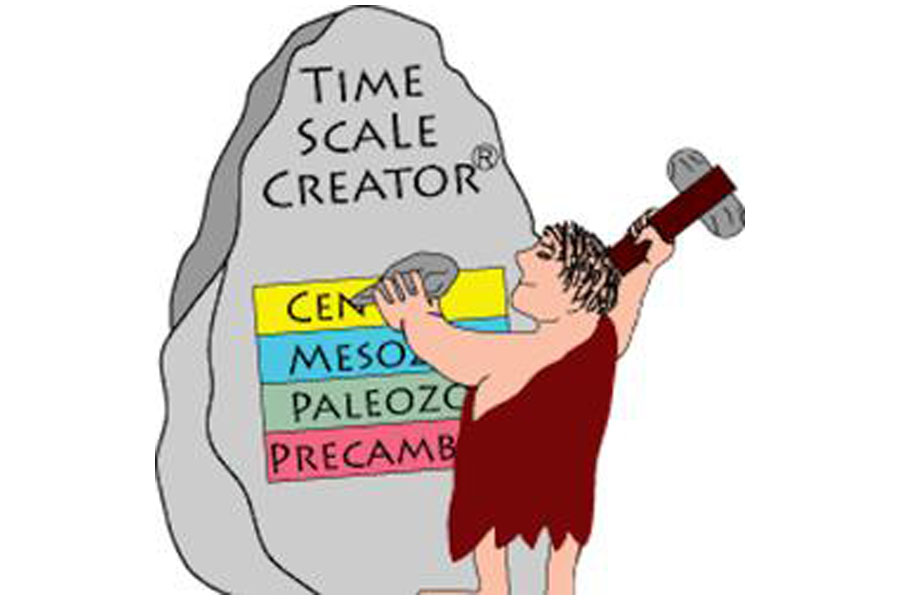 Earth History Visualization graphic
Earth History Visualization graphic
“Enormous untapped potential”
What does the future hold for VIP?
“There’s enormous untapped potential to broaden collaboration across disciplines – from technology to engineering, to the sciences, to mathematics, and even to liberal arts,” Allebach said. “All these fields have a need for advanced computation, data analysis and AI, and VIP can facilitate a blending of knowledge and perspectives to produce better solutions. We plan to continue expanding the VIP experience by incorporating new disciplines, research areas and industry sponsors.”
How to get involved
Faculty members and industry partners may contact Carla Zoltowski at cbz@purdue.edu.
Undergraduate students may register for VIP prior to the beginning of each semester.
